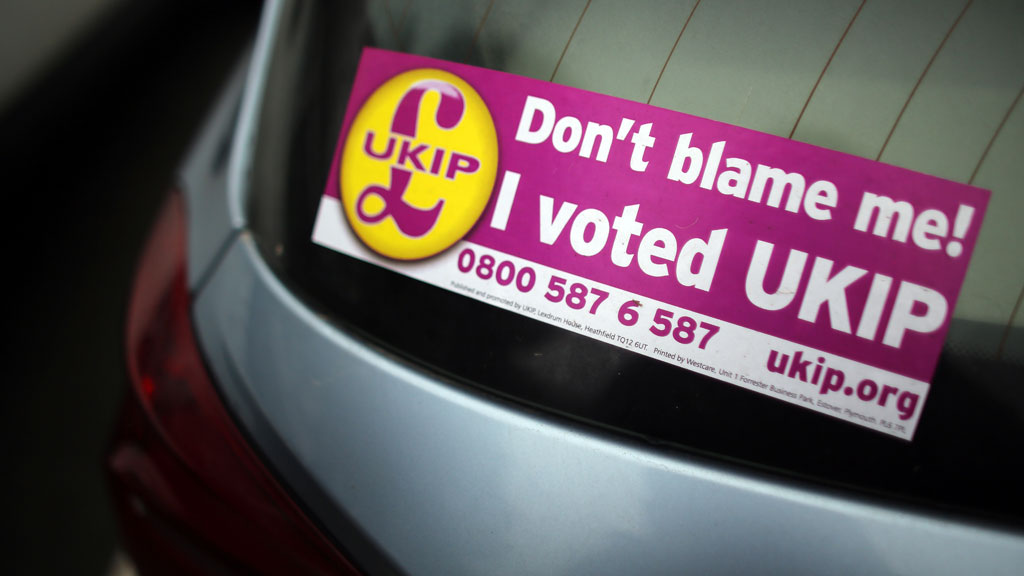Is Ukip’s rise really a breakthrough?
After making big gains in the county council elections, Ukip leader Nigel Farage says: “I don’t think these votes are going away quickly.” So what are the prospects for the “fourth party”?

Ukip, which wants Britain to pull out of the EU and pull up the drawbridge on immigration, caused an upset in the South Shields by-election, forcing the Conservatives into third place and achieving 24 per cent of the vote.
It was a continuation of the party’s recent success in by-elections: last month, Ukip came second in Eastleigh, with 27.8 per cent of the vote.
Across England, in the county council elections, Ukip appears to have won a quarter of the vote and an impressive number of seats (when the counties were last fought over, in 2009, it won just seven).
The challenge for Ukip was gaining seats, and it has managed this. In first-past-the-post Britain, parties can pick up a decent percentage of the vote, but fail to translate this into seats.
In the 2012 local elections, Ukip performed reasonably well in percentage of the vote terms in seats where it was standing (13 per cent), but failed to increase its seats tally.
This time it is a different story, which suggests Ukip may have become better at targeting seats it has a good chance of winning (helped, of course, by the decision to field three times as many candidates as in 2009).
More to fear
With Ukip a party of the right, the Conservatives have more to fear than Labour and the Liberal Democrats.
A Times/YouGov survey, based on polling in April, shows that six times as many Tory voters are switching to Ukip for every one Labour voter, with the Lib Dems losing twice as many voters to Ukip as Labour.
The implication is that Ukip is replacing the Lib Dems, in a coalition government with the Conservatives since 2010, as the mid-term protest party.

David Cameron’s decision to offer voters a straightforward in/out referendum on the EU by 2017 if the Tories win the next election was prompted in part by fear of Ukip.
But, if the county council elections are anything to go by, it has not done the trick, and the prime minister is now under pressure from some in his party to legislate for a plebiscite during this parliament.
In his BBC interview, Mr Farage admitted that Ukip had a “problem” at the next general election because of first-past-the-post, but said his party could shift the political landscape as the SDP/Liberal alliance managed in the 1980s.
At the 1983 election, with Labour at its lowest ebb, the Alliance famously won 25.4 per cent of the vote, but only 3.5 per cent of seats (23), compared with Labour’s 27.6 per cent of the vote and 32.2 per cent of seats (209).
But Mr Farage said the Alliance’s success paved the way for Tony Blair’s centrist leadership of the Labour party, implying that Ukip could exert similar influence on the Tories by pushing them to the right.
Immigration message
After Margaret Thatcher’s death, Mr Cameron was asked if he was a Thatcherite and said no. Nigel Farage would presumably have few qualms answering yes.
The rise of Ukip should not be over-stated. Despite its success at the polls, it does not control any councils and will find it extremely difficult to win even one Westminster constituency in 2015. The best it can hope for may be changing the political weather.
It is the party’s stance on immigration and the EU that is winning votes. A YouGov poll shows that 76 per cent of people who say they would vote Ukip in a general election are motivated by the party’s message on immigration, with 59 per cent citing the EU and 47 per cent dissatisfaction with the other parties.
In the run-up to the elections, Mr Farage had a spot of bother with a few of Ukip’s would-be candidates after their far-right sympathies were revealed.
Most Ukip voters on Thursday would no doubt run a mile rather than vote for an openly racist party.
But Mr Farage will surely be concerned by this comment on the YouGov website: “My wife, eldest son and I voted UKIP as we had no NF (or BNP) candidate standing.”